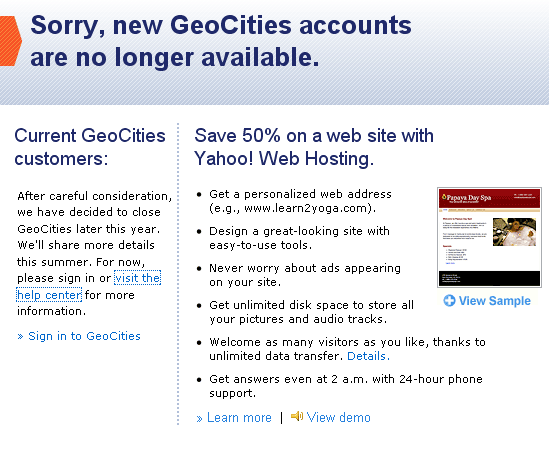Yahoo Pulls the Plug on GeoCities
A few days after Yahoo announced it would lay off nearly 700 workers, Yahoo is shutting down GeoCities, which it acquired in 1999 for $4 billion. GeoCities is the latest casualty in Chief Executive Carol Bartz's campaign to close duplicative and underperforming products. Last week, Yahoo announced the closing of Jumpcut, an online video-editing service, and FareChase, a travel Web site. During Yahoo’s earnings call on Tuesday, Bartz also mentioned the discontinuation of Yahoo Briefcase, My Web, Yahoo Audio Search, RSS ads, Yahoo Pets, Yahoo Live, Kickstart, and Yahoo For Teachers.
The company posted a notice on the GeoCities site indicating
it is no longer giving out new accounts. Yahoo has said it will close the site later
this year and will notify customers about how to save data sometime this summer.
This means it is still possible Yahoo could give users the ability to transfer
a site to another service, similar to what Yahoo did when it shut down Yahoo
Photos. Given recent events at Yahoo and the current economic climate, however,
we aren’t expecting this graceful transition to be an option.

For now, GeoCities users can enjoy their sites until later this year. For continued service, Yahoo is encouraging users to upgrade to Yahoo’s Web Hosting service. Considering many GeoCities users weren't technical experts, it is likely a lot of amateur Web sites soon will vanish as a casualty of Yahoo’s business priorities and the rapid changes we see every day with the Internet.
GeoCities gained widespread recognition as a free service that let users create personal home pages with photos and other information with relative ease. It was one of the first companies to build online communities by allowing users to associate their pages with particular communities or neighborhoods. In the late 1990s, GeoCities hosted more than 3.5 million websites.
In recent years, however, GeoCities has fallen out of favor as a new generation of social networking sites such as Facebook and MySpace have taken over. These services as well as others such as Twitter, YouTube, and Blogger, provide easy ways to notify interested parties of new activity. These notifications help your network stay up to date with new information in a simple and easy way that personal websites can’t replicate or compete with.

